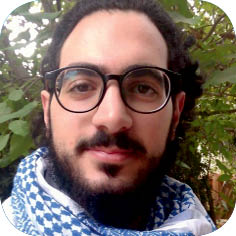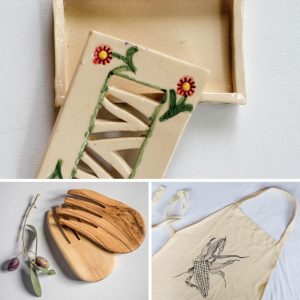When we study the conditions under which women artisans live in Palestine, we must consider a number of factors that affect women’s employment: societal factors such as family status, gender roles, and education, as well as political and economic factors. Women artisans tend to come from poorer areas in Palestine or from places where unemployment rates are higher, such as Khan Yunis, Rafah, the southern Gaza Strip, and Jenin in the West Bank. Women from cities such as Ramallah and Al-Bireh, Jerusalem, and Nablus are less likely to start their own projects because they can take advantage of employment opportunities in the private or public sector.*1
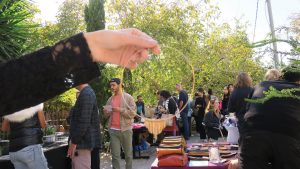
Political, social, and economic factors prompt women to become artisans. The second Intifada encouraged many women to seek work and support the income of their families when their husbands or sons increasingly faced unemployment, especially those who had been working in Israel.*2 In an unintended positive side to the Intifada, the societal constraints that previously had prevented women from pursuing work outside of their homes were relaxed. But the gender roles of these women were not truly changed or challenged because in many cases their work was considered a temporary necessity, to be pursued until men would go back to being the breadwinners. Married women are more inclined to start their own businesses and projects as their status gives them protection from a societal point of view. Divorced women or widows are less likely to initiate their own projects in societies that are more conservative due to fear of not having enough protection or support from their communities.*3
The Aseela project in Dheisheh Refugee Camp in Bethlehem was established in 2004 by a group of refugee women who sought a creative way to respond to many families’ need for income generation. Today, these women produce traditional soap made from olive oil.
Women who have finished secondary education are more likely to start their own projects (21.6 percent), followed by women who finished primary education (24.5 percent), and college graduates (14.4 percent).*4 According to the focus group examined by a study carried out by Qazzaz, Morrar, and Adwan,*5 the reason for this distribution is that girls who do not finish higher education tend to come from lower-income families and get married at an early age. Secondary education raises their level of education and self-confidence and thereby empowers them to pursue courses in subjects that enhance their technical and administrative skills and thus prepare them to set higher goals. College graduates have the ambition to gain employment; but those who don’t find it frequently embark on the journey to start their own projects. Although these numbers are from older research, a publication by UN Women titled “Women and Economy 2014–2016,” which used statistics from the Palestinian Bureau of Statistics Labor Force Survey 2012, backs the same logic by stating that “women’s participation in the labor force was the highest among women with 13 years of education or more compared to other educational attainment groups. The participation rate was 43.7 percent for women with 13 years of education or more, compared to 6.6 percent for women with 9 to 12 years of education, and 12.9 percent for women with 1 to 6 years of schooling.”*6
Um Raed is a Bedouin from Arab Al-Jahalin in Al-Khan Al-Ahmar who started wool felting a year ago, after being trained by Sunbula, a not-for-profit fair trade organization in Jerusalem. “The Bedouins create handicrafts because they need income,” she explains. Before, Um Raed used to go to Jerusalem to sell yogurt, goat cheese, and butter, but after closures were imposed by the occupation, she could no longer reach Jerusalem and had little to no income. Her husband is unable to find work, and she has three children to provide for.
Women are interested in work that is socially acceptable, such as that which utilizes skills related to Palestinian heritage. In the West Bank, projects in sewing and embroidery are ranked first choice, whereas hairdressing and food preparation come in second. In Bethlehem and Jerusalem, women are encouraged to work in projects related to wood carving, glass manufacture, and embroidery because these crafts are in demand with tourists, especially during the holiday seasons. In Nablus, women focus on jewelry and accessories, whereas women in Gaza engage preferably in beekeeping and agriculture. “Cottage-industries such as home embroidery are often valuable to women. Given the nature of female domestic roles, particularly in conservative societies, embroidery allows women to work flexibly and make money without leaving their family,” states Rachel Dedman.*7
Embroidery is among the most important industries due to its being a heritage skill that doesn’t require much training or education. Women embroiderers “inherit” this skill from their mothers or grandmothers. Many of these women have difficulties in accessing the market; hence, they find it easier to sell their creations to women’s cooperatives or retailers. Unfortunately, markets don’t often prioritize fair trade and ethical consumerism.
Ethical consumerism can be promoted by inviting audiences via online channels and by questioning the available buying choices. “Purchasing power” is named as such for a reason, and our actual power can be applied consciously, for example, by choosing to learn about the lives of local producers and by taking active actions to shift our buying behaviors. When we go to the market to buy a keffiyeh or a traditional gift for our relatives, we must ask vendors about their sources and do our best to seek handicrafts or food products made by local producers. Many might comment that locally produced handicrafts are expensive; this is true due to the fact that they are handmade. For instance, it takes three to four working days for four artisans to make 25 wool camels: sourcing the wool, cleaning it, drying it, and then felting it to create the end product takes so much time that in the end, they barely make enough money to cover their labor and the costs of raw materials.
Ammoun Sleem founded the Domari Gypsy Society that serves a community of gypsies who came to Palestine more than 500 years ago. As a minority living in Jerusalem, the dom face many obstacles imposed by the Israeli occupation authorities in East Jerusalem that undermine their identity. In 2005, a society center was established to help the community respond to severe discrimination, cultural marginalization, and poverty. The Domari Society provides support and opportunities for the dom community, including development programs such as tutoring and learning programs for dom children, as well as work and skill improvement courses for dom women.
Although I grew up in Ramallah, I met women artisans for the first time through my work for Handmade Palestine. With this project, Morgan Cooper promotes 18 women’s cooperatives and helps them sell their products. Some cooperatives include more than 100 women who come mainly from villages and refugee camps around Hebron, Bethlehem, Jerusalem, Ramallah, Nablus, and Gaza. They frequently belong to communities that are marginalized due to the Israeli occupation or because they are a minority. Many of these women artisans are the sole providers for their families.
These examples are but a few of the hundreds of stories of women artisans who struggle against occupation and other socio-economic challenges, creating handicrafts to support themselves.
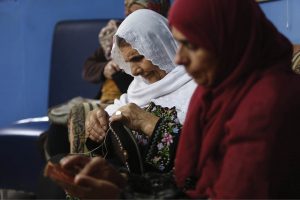
Dalal, a 58-year-old woman from Beit Duqqu, a village northwest of Jerusalem blocked by the separation wall, sought work 15 years ago because the financial situation of her household was dire. When after the second Intifada her husband was no longer permitted to work in 1948 Palestine, he was no longer able to provide for his family. “I wanted my children to pursue their university education,” Dalal explains, “and I didn’t want to be under the mercy of my husband when it comes to asking him for money. I first took courses in self-development and stress management. Later on, along with other women, I began to do embroidery. We divided the work and helped some women to work from home because they couldn’t leave their houses.” Initially, Dalal faced objections from her relatives. “My brothers would argue with me saying that I have everything I need. They thought that life was only about having enough money to sustain a living. I wanted to be able to discover the world and to network.” Today, many years of experience have made Dalal an example of an entrepreneurial woman in her village. She is trusted by many men in the village who want to send their daughters to development programs. “I am the head of food production and processing at the community center, and my brothers are very proud of me. But I remind them sometimes of how they used to object to my going out to seek work.”
Local bazaars provide a great opportunity for Dalal and many other women artisans to network with retailers interested in their work as they bring the local community together with women artisans. For many of these women, local bazaars are their only marketing channels, as they are not internet savvy and don’t market themselves using social media; they have no skills that would allow them to produce printed brochures to introduce their work.
Ruwaida, a single mother of one from Nisf Jbail, a village northwest of Nablus, started working more than three years ago at the Nisf Jbail Ceramic Center. It was her first job. As she had no other opportunities, she was inspired to develop her hobby – painting on ceramics. When asked about the hardships she faces, Ruwaida noted that it was mainly marketing, as she depends solely on retailers in Ramallah, Jerusalem, and Jericho, in addition to tourists who visit her village. These connections are affected by the political situations and are unreliable. In addition, Ruwaida seeks to participate in bazaars to showcase her work and make contact with more retailers.
When asked about their wages, the women stated that they are not paid fairly. Ruwaida earns 5 shekels per hour, and Dalal said that although she has worked at the development center for 15 years, no severance pay is guaranteed, nor does she have health insurance. This means that when she retires from her work at the society center, she won’t have any financial security. This is the case for all the women who work in women’s associations and society centers in Palestine and has to do with local policies.
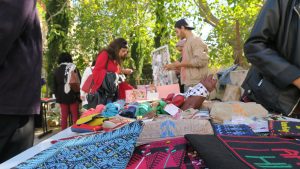
I encourage you to imagine the lives of these women. They are only examples of those at the bottom of the hierarchy of our society, barely sustaining their lives, but striving every day to live and provide for their children. And while we all strive to thrive under occupation and although many circumstances are out of our hands, we have the power to make their lives better by adjusting our purchasing behaviors and choices today.
*1 Dr. Hadil Risq Qazzaz, Shua’a Mrar, and Yousif ‘Adwan, Female Entrepreneurs in the West Bank and Gaza Strip: Current Situation and Future Prospects, Local Aid Coordination Secretariat, 2005, available at http://www.lacs.ps/documentsShow.aspx?ATT_ID=2020.
*2 Ibid. *3 Ibid. *4 Ibid. *5 Ibid.
*6 Women and Economy, Fact Sheet Economy, UN Women, available at http://www2.unwomen.org/-/media/field%20office%20palestine/attachments/publications/2013/fact%20sheet%20economy_en.pdf?la=en.
*7 At the Seams, A Political History of Palestinian Embroidery, Rachel Dedman, curator, international exhibition, Beirut, 2016.

